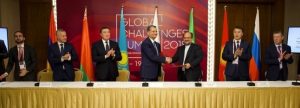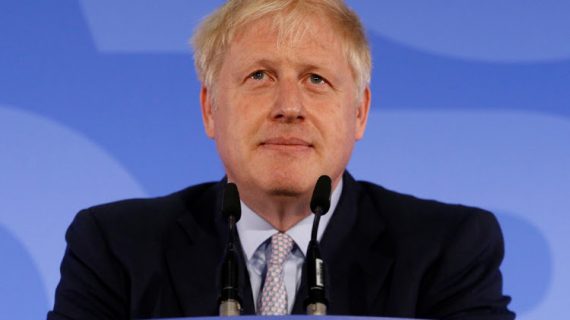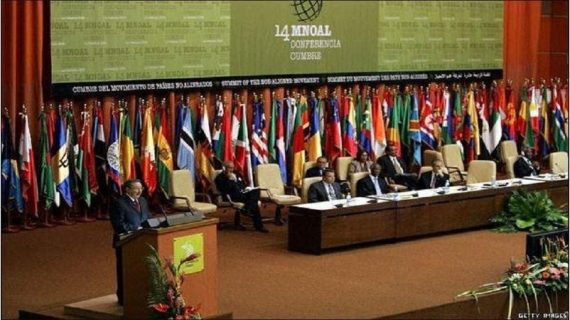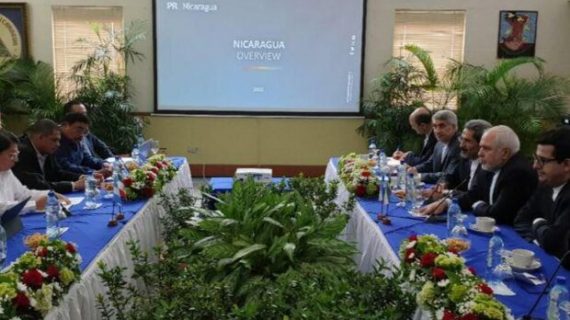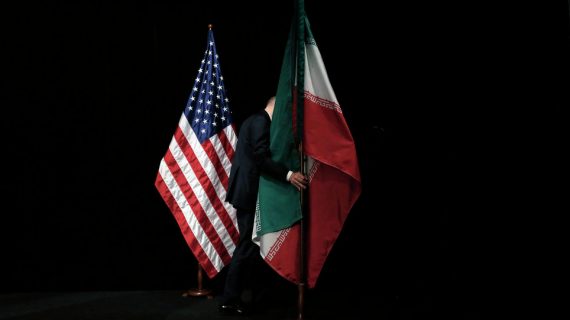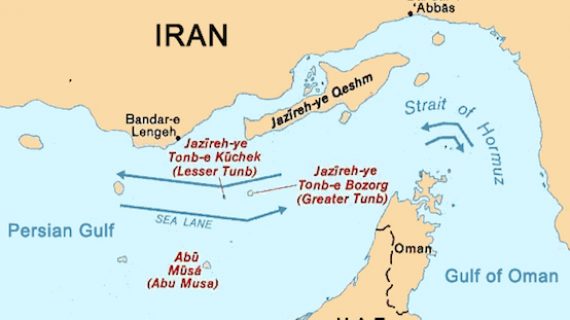Iran, EEU Sign Trade Tariff Deal
The deal lowers or abolishes customs duties, setting off a three-year process for a permanent trade agreement
The biggest asset of the agreement for the union is access to the growing Iranian market with more predictable “rules of the game” in place
Reported by HPMM Group according to FINANCIAL TRIBUNE ; The five-nation Eurasian Economic Union has signed a three-year provisional agreement with Iran to welcome the Islamic Republic into the bloc’s free-trade zone.
“The temporary agreement stipulates an effective dispute settlement mechanism, including arbitration … It also creates a joint committee of high-ranking officials and establishes a business dialogue,” chairman of EEU economic commission board, Tigran Sargsyan, said at the ceremony in Astana, Kazakhstan, on Thursday.
The arrangement is the first step in implementing free trade between Iran and the five members of the union, namely Armenia, Belarus, Kazakhstan, Kyrgyzstan and Russia, RT reported.
The free trade zone agreement between EEU and Iran lowers or abolishes customs duties, setting off a three-year process for a permanent trade agreement, Russia’s state-run RIA Novosti news agency reported on Thursday.
“The current agreement includes an initial list of goods with lowered or cancelled customs fees upon its enforcement. The agreement covers half of mutual trade,” Sargsyan was quoted as saying by Armenpress, adding that bilateral trade reached $2.7 billion in 2017.
“Our negotiators have already set a long-haul objective for the next three years to agree a full-fledged accord on a free trade zone,” Sargsyan was quoted by Sputnik as saying.
EEU has also signed a trade and economic cooperation agreement with China.
> Major Advantages
According to Belta news agency, Sargsyan called several major advantages in EEU countries and Iran after the agreement comes into force.
First of all, entrepreneurs will be able to save on customs duties. The list for EEU includes meat and fat-and-oil products, certain types of confectioneries and chocolate, cosmetics, electronic and mechanical equipment.
Iran will enjoy tariff preferences on a wide list of food products, primarily vegetables, fruit, dried fruit and also building materials, crockery, carpets and nonferrous metal products.
With regard to industrial products, Iran will reduce the average rates of import duties for EEU member states by 7% (from 22.4% to 15.4%), which will decrease duties on these goods for Iran by 3.3% (from 8% to 4.7%). Iran will cut import duties on farm products by 19% (from 32.2% to 13.2%) and EEU by 5% (from 9.6% to 4.6%).
The second advantage is a transparent and predictable trade environment.
“The provisional agreement provides for compliance by the parties with the fundamental principles of international trade. The document formalizes the scheme similar to WTO [World Trade Organization] rules, which imposes obligations and requirements on Iran though the country is not a WTO member,” Sargsyan stated.
The parties also agreed not to apply unreasonable non-tariff measures restricting trade in respect of goods listed in the agreement.
EEU was established in 2015 based on the Customs Union of Russia, Kazakhstan and Belarus, and was later joined by Armenia and Kyrgyzstan. In 2016, Vietnam officially became the first non-regional country to join the bloc’s free trade zone, which is designed to ensure the free movement of goods, services, capital and workers. Since then, more than 40 countries and international organizations, including China, Indonesia, South Korea, Egypt and India, as well as some South American countries, have expressed interest in a free-trade deal with EEU.
“Iran could become the sixth EEU member,” Russian Energy Minister Aleksandr Novak was quoted as saying by UPI.
Thursday’s three-year provisional agreement will help determine if long-term Iranian membership is viable.
“The move to enter into a temporary agreement making for a free trade zone to be set up between Iran and the Eurasian Economic Union, which is currently at an advanced stage, will obviously trigger further development of our bilateral trade and expansion of investment cooperation,” Sargsyan said.
> In the Context of US Sanctions Snapback
The Astana agreement was signed just days after the United States decided to reimpose economic sanctions on Tehran after unilaterally pulling out of a 2015 international agreement on the Iranian nuclear program.
Russian Chamber of Commerce and Industry Vice President Vladimir Padalko told Russian government-owned TASS on Thursday the resumption of US sanctions on Iran will not push away entrepreneurs or disturb interaction with the agreement.
“This is an extra signal to everyone that the Iranian market awaits our businessmen and we will proactively work there,” Padalko said.
“The business hopes that the free trade zone agreement will facilitate interaction between entrepreneurs from EEU and Iran, receipt of visas to this country and that the agreement will also promote the transition to settlements in national currencies, because we cannot work with the dollar now in view of US sanctions,” he added.
Earlier on Wednesday, the head of Majlis Economic Commission of Iran said Tehran intends to boost economic ties with Moscow and the prospect of the return of US sanctions will only serve to strengthen them.
“Not only will the previous agreements remain in force, but there will be new ones; there will be new contracts,” Mohammad Reza Pour-Ebrahimi also told RIA Novosti.
After the US withdrew from the Iran nuclear deal, Washington said it would give European companies six months to wind up their investments in Tehran or risk US sanctions, and they are also forbidden from signing any new contracts with the country.
Russia said it will remain committed to the deal, describing the US actions against Iran as “veiled protectionism”.
> New Opportunities for Armenia
Armenia’s new government welcomed the signing on Thursday of the provisional free-trade agreement between Iran and the Russian-led Eurasian Economic Union, saying that it should boost Armenian-Iranian trade.
Armenia’s newly-elected Prime Minister Nikol Pashinian said the terms of the deal “fully” reflect Armenia’s national interests.
“We hope that it will stimulate our commercial ties [with Iran,]” he told reporters. “It opens up opportunities. We hope to utilize those opportunities in full.”
Pashinian and Iranian President Hassan Rouhani stressed the significance of the trade accord when they spoke by phone at the weekend.
Minister for Economic Development Artsvik Minasian said the deal also puts Armenia in a better position to serve as a transit route for commercial operations between Iran and other EEU member states.
“This is also an opportunity to manufacture some products in the Meghri Free-Trade Zone,” he said.
The minister referred to a tax haven set up near Meghri, an Armenian town on the Iranian border, last December. Businesses operating there are exempt from virtually all types of taxes. They are allowed to engage in not only manufacturing but also trade, cargo transport and even tourism.
Armenian Deputy Prime Minister Tigran Avinyan told Sputnik that the newly-signed provisional agreement on a free trade zone between the Eurasian Economic Union and Iran will provide new opportunities for Armenia to step up trade with the neighboring country and develop new production capacities.
“Convinced that the agreement will open up new opportunities for Armenian goods to expand into the Iranian market, and also create favorable conditions for developing new production capacities in Armenia,” Avinyan wrote on Facebook.
The official noted that the agreement had been signed following lengthy and difficult talks, stressing a considerable role of the Armenian side during the entire negotiation process.
According to official Armenian statistics, Armenian-Iranian trade stood at a modest $263 million last year. Armenian exports to Iran accounted for only about one-third of that turnover. Armenian manufacturers have long complained that the Islamic Republic’s protectionist policies severely limit their access to the Iranian market.
> Long Way to the Deal
In December 2016, EEU and Iran started working on a free trade agreement with a view to boosting mutual economic cooperation.
Veronika Nikishina, the minister for trade of the Eurasian Economic Commission, EEU’s executive body, in an interview with Sputnik, recounted the long way that the sides had come to secure the deal.
The minister noted that having reached an agreement to launch talks on the issue, the two sides had established a special joint research group tasked with determining the most promising areas for preferential trade.
The group ultimately concluded that it would be more reasonable to strike a “provisional agreement, which will cover a limited set of goods, in order to evaluate which impact it will have on mutual trade”, and only then switch to a full-fledged free trade area, she added.
Nikishina noted that the range of goods and the deal’s timeframe had been the main sticking points during the negotiation process.
The provisional agreement covers a limited set of goods and with a limited level of liberalization. It was made to enable the two sides to yield benefits of liberalization once the agreement takes effect.
“Since the agreement will last for only three years, we could not allocate time for those sectors which are not involved in exports to Iran to ‘warm up’. The agreement, thereby, mainly aims to boost positions of the existing exporters,” she said.
According to Nikishina, the union has received tariff concessions on a wide range of goods in agriculture, such as beef, lamb, butter, mineral water, grains, tobacco and on such exports items as steel, cosmetics, timber, tractors and buses.
Iran’s concessions to the union are estimated at about $1 billion in monetary terms, she added.
The minister noted that the provisional agreement established a trade regime similar to WTO rules while stipulating certain transition periods to let Iran, which is not a WTO member, adapt to new provisions.
“So, our agreement not only reduces tariffs but also removes non-tariff barriers, increases predictability and attractiveness of the Iranian market,” she said, clarifying that the country’s legislation had previously lacked transparency and non-discrimination norms that are commonplace in WTO member states.
“Such non-tariff barriers are actually the main hurdles that businesses face while seeking to expand into the Iranian market.”
Nikishina also said the Iranian legislation stipulated a minimum 4% import duties and Iran had notified the union that it was not ready to negotiate this sensitive issue.
“As a result, the sides agreed to fixed tariff discounts for EEU countries. The ultimate removal of import duties is set to be a subject of negotiations on the full-format trade area,” she said.
“I am convinced that the regime of preferential trade between the union and Iran will have a positive impact not only on the signatories to the agreement but also on the whole Middle East and Central Asia, since a new center of trade and economic gravity will be created.
Nikishina declared that the implementation of the agreement will facilitate the accelerated development of infrastructure of the International North-South Transport Corridor that runs through Iran and Russia through the Caspian Sea.
The official noted that the biggest asset of the agreement for the union is access to the growing Iranian market with more predictable “rules of the game” in place.
“Under the circumstances, when internal consumption is on decline and economic growth rates are slowing down, such an opportunity should not be underestimated. Specifically, it should not be overlooked that there is a growing middle class in Iran who wish to purchase goods at affordable prices,” she said, adding that the provisional agreement gave EEU countries competitive advantages over other economic players on the Iranian market.
Nikishina also specified that the agreement would come into effect in a 60-day period after all the required legal procedures in Iran and EEU countries were finalized, stressing that it would not take too much time due to the mutual interest in streamlining trade.
Over the next three years after the agreement comes into force, the two sides will conduct talks on a full-fledged free trade agreement.
“In any case, I am sure that the provisional agreement is only the first step toward deeper trade and economic cooperation of Iran and the union, and all the parties concerned are benefiting from this process,” she concluded.

